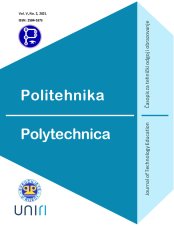Perspektive učenja i poučavanja na daljinu sa stajališta nastave tehničke kulture: Iskustva učitelja tijekom COVID-19 pandemije i perspektive za budućnost
Perspectives of distance learning and teaching from the point of view of technical culture teaching: Teachers' experiences during the COVID-19 pandemic and perspectives for the future
Author(s): Damir Purković, Zvonimir Lapov Padovan, Dino DelačSubject(s): Education, Distance learning / e-learning
Published by: Akademsko politehničko društvo APOLD Rijeka
Keywords: COVID-19; e-learning; distance learning and teaching; Technical Culture; technology education;
Summary/Abstract: Distance education can play an important role in the teaching process and in achieving learning outcomes, especially in the context of the exceptional circumstances caused by the crisis COVID -19. However, the specifics of technical education require the achievement of results of a practical nature, which is not easy to achieve with this approach. Therefore, the aim of this research is to determine how and in what ways distance education and teaching are applicable in teaching technical culture, summarizing the experiences of teachers during the pandemic COVID -19. The research was conducted in the form of a semi-structured interview in which teachers presented their own experiences and views on the impact of such teaching on students. From the research findings, it can be concluded that such teaching can be used under 'normal' circumstances for developing students' digital literacy skills, developing literacy and communication skills in the ICT environment, encouraging introverted pupils, developing pupils' independence and as a qualitative supplement of direct teaching. Nevertheless, distance education cannot be an "equivalent alternative" to direct instruction because of the lack of systematic development of technical competencies and skills, the lack of social interaction (verbal, physical, emotional), the presence of "critical" groups of pupils, and the complexity of pupils’ development. Although it is necessary to further investigate the effects of such instruction on student achievement and the consequences for their development, it is clear that in this developmental age, learning and teaching at a distance cannot produce targeted student competencies.
Journal: Politehnika: Časopis za tehnički odgoj I obrazovanje
- Issue Year: 5/2021
- Issue No: 2
- Page Range: 29-37
- Page Count: 9
- Language: Croatian

